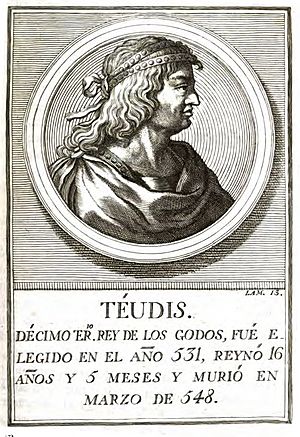Theudis facts for kids
Theudis (in Spanish: Teudis, in Portuguese: Têudis), born around 480, was a king of the Visigoths. He ruled the Visigothic kingdom in Hispania (which is now Spain and Portugal) from 531 until his death in June 548.
Contents
Early Life and Rise to Power
Theudis was an Ostrogoth, a member of another powerful Germanic group. He served Theodoric the Great, a very important Ostrogothic king. Theodoric sent Theudis to govern the Visigothic kingdom. This happened when the Visigothic king, Amalaric, was still a child. Amalaric was the son of King Alaric II.
Theudis married a wealthy Spanish woman. She owned a lot of land and had great riches in Spain. With her money, Theudis was able to create his own private army of two thousand soldiers. This made him very powerful and somewhat independent from King Theodoric.
Even though Theudis was powerful, Theodoric did not try to stop him. One reason was that the Franks, another Germanic group, were a threat. The Franks had killed the Visigothic king Alaric II in a battle. Theodoric did not want to give them another reason to attack. Also, Theudis always followed Theodoric's orders and sent the yearly payments he owed.
After King Amalaric died, Theudis was chosen to be the new king. Historians believe that other Ostrogoths who had come with him to Spain supported his election. Some also think that his family was very powerful, which helped him become king.
King Theudis's Reign
Facing the Franks
In 541, King Theudis had to fight against the Franks. The Frankish kings, Chlothar I and Childebert I, led their armies into Spain. They reached the city of Zaragoza and surrounded it for 49 days.
According to some stories, the Franks stopped their attack when they heard that the city was protected by holy items of Saint Vincent of Saragossa. The outcome of this invasion is told differently by various old writings. One account says that Theudis's general, who later became King Theudigisel, defeated all the invaders. Another story says the Franks took a lot of treasure and returned home. However, this was the first time the Visigoths won against the Franks, which made Theudis more respected.
Dealing with the Byzantines
Early in his rule, around 533, Theudis met with people from the Vandal kingdom. The Vandals were asking for help against the Byzantines, who were about to attack them. Theudis welcomed them and held a feast in their honor.
During the feast, Theudis asked them about things back home. The Vandal visitors had traveled slowly and did not know what was happening in their capital, Carthage. However, a merchant ship had left Carthage the same day it fell to the Byzantines. This ship arrived in Spain first, bringing the news to Theudis.
So, when the Vandals asked for an alliance, Theudis refused. He told them to go to the coast to find out what was happening at home. Confused, the Vandals followed his advice. They returned to Carthage and were captured by the victorious Byzantines. Some historians think Theudis took advantage of the Vandals' defeat by taking control of some land in North Africa near Spain.
In 542, the Visigoths tried to defend the city of Ceuta when the Byzantines attacked it by land and sea. However, they were not successful. It is said that the Visigothic army refused to fight on the Sabbath (Saturday). When the Byzantines learned this, they attacked the Visigoths and defeated them.
Laws and Religion
Even though Theudis was an Arian Christian, he was praised for being fair to the native Roman Catholic citizens. He allowed their bishops to meet in Toledo to discuss church matters. Several important church meetings took place during his reign.
During his time as king, Theudis also updated the Gothic law. This new set of laws was put into effect in November 546. It included many Roman laws and aimed to make sure that judges were paid fairly for their work.
Death
In 548, King Theudis was killed in his palace. A man pretended to be mentally ill to get close to him and then struck the fatal blow. As he was dying, Theudis reportedly asked that his killer not be harmed. He said that he deserved what happened because he himself had killed his own leader when he was a private citizen.
Historians believe this murder might have been part of a "blood feud," which was common at the time. Many kings and leaders during this period did not die of natural causes.
See also
 In Spanish: Teudis para niños
In Spanish: Teudis para niños
 | Stephanie Wilson |
 | Charles Bolden |
 | Ronald McNair |
 | Frederick D. Gregory |


